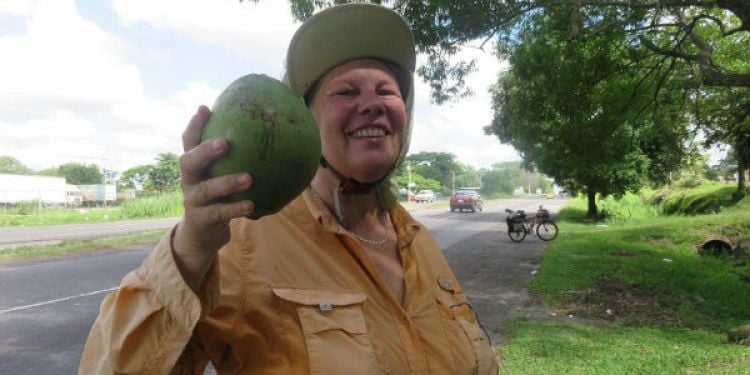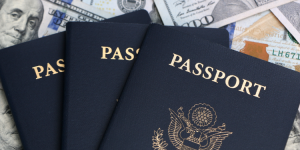
Where are you from, Kris, and what are you doing nowadays?
I'm from NY. I lived in a number of places, the last being Florida for 17 years. I'm a nurse and my husband did home remodeling and repairs by day, and was a musician by night. Nowadays, we are both retired, but my husband enjoys opportunities to play music now and then.
Why did you choose to expatriate to Panama? What has attracted you to David?
We had a number of requirements for our new home - warm climate, close enough to visit the US, stable government, good infrastructure, crime under control, etc. Panama seemed the best fit so we visited Panama City. We loved the country but the city was too much at our age. We knew we wanted to be in a city though, so our next visit was to be David, the next biggest city. It felt right, so we took the leap of faith and settled here.
What were the procedures to follow for a US national to move there?

Pack your suitcase and get on a plane! You can just come on a tourist visa for 6 months, rent or buy a house, buy a car, set up a life. If your six months are running out, you can leave for a day and come back, and start another 6 months (checking the rules and requirements to get back in). We were here as tourists for a while before we qualified for residency (waiting on my social security). But, it is much easier to live here as a resident. I hear the country is taking steps to discourage the perpetual tourist.
There are a number of options for residency and a lawyer can explain these to you and help you through the process. As for details, that is an individual decision. People ship containers or come with only a suitcase. People decide on various places to live, sometimes changing their mind and trying other places before finding one that is the right fit. Do you buy or rent, or build? Do you bring pets? Do you bring a car (not recommended)? How do you work out the details? There is no answer that fits everyone.
How long have you been in the country?
Two and a half years.
Was it difficult to find accommodation there? What are the types of accommodation which are available?
No, it was not difficult. There is a wide variety of options, from very basic and inexpensive to large and opulent. It depends on what you want, what you can afford, what area you prefer, etc. It's an interesting country with many options from beaches to mountains, from warm to cool, from economical to very expensive. If by accommodation you mean hotels and hostels, there are also many options from inexpensive hostels to very upscale hotels and all inclusive resorts.
How do you find the local lifestyle?

David is a working city in an agricultural area. People here are busy with their lives, but they are also very friendly and welcoming. If you ask someone what is important, you are likely to hear - family, friends and enjoying life.
How about the expats living there?
There is a large https://www.expat.community in Boquete in the mountains not far from us, but in other areas expats tend to be more blended into the local community.
Have you been able to adapt yourself to the country and to its society?
Yes, I have found this to be surprisingly easy. Learning a new language has been a challenge. Sometimes, I have had to learn new procedures for getting things done, but generally it has been easy. But this is an individual thing. Others have found it quite difficult. I think it helps if you embrace the experience. If you want everything like it was in the US, it's going to be difficult. If you look forward to the differences, it can be frustrating at times, but overall it's a lot of fun and always interesting.
What does your every day life look like in David?
It is surprising how busy you can be in retirement! I often wonder how I had time to work. I ride my bicycle a lot for exercise and enjoyment. I spend time with friends, work in the yard. I'm taking a drawing and painting class. I also write a blog, The Panama Adventure, enjoy photography, and of course, there are the daily chores of keeping a house, doing errands, etc.
It is very easy to make friends here. So if you are outgoing and have things you like to do, you can have an active social life and days filled with activities you enjoy.

What has surprised you the most at your arrival?
The people. Strangers on the street wouldn't just tell me where to find something. They would stop what they were doing, walk with me to the shop, talk with the sales people and not leave until they were sure I had exactly what I needed and at the best price. It is normal for people to help each other out and not expect anything in return. People also drop in an visit without the advance planning we are used to in the US. Finding your way around can be a challenge though, because many streets don't have names. Addresses are often something like "on the street behind the supermarket next to the tire shop on the corner".
Any particular experience you would like to share with us?
It's still a joke with my neighbor. We were going to the Feria (the fair, a big yearly international event in David). She told me I would need three Balboas. But no! I am driving. I don't even drink that much Balboa (a local beer) at home and certainly not when I am driving. What she meant was three dollars. The currency here is a balboa which is the same as a dollar. We still laugh about that one. As you can imagine, there have been other funny instances when I confuse Spanish words. I called my friend's calf a "fork" for a while, and another friend "bit" a new house instead of moved to a new house. Oh, and I went to Panama City to visit the "slaves" when I mean the locks in the canal. People here usually have a great sense of humor and love to laugh.
What is your opinion on the cost of living in Panama? Is it easy for an expat to live there?
We are living on about 1/3 of what it cost us to live in Florida. Of course, you can spend as much or as little as you want depending on where and how you live. In Panama City, rents are high and if you enjoy eating out and doing other things that cost more, life will be expensive. If you live in the interior in a modest home and eat like a Panamanian, you can live for much less. There are whole families that live on $ 600-1,000 a month, or even less.

Your favorite local dishes?
Tamales! Many think Panamanian food is boring, but I like it. I'm lucky that a good friend is a former restaurant owner and excellent cook. She has taught me to make quite a few Panamanian dishes. A typical midday meal is often a piece of meat (chicken, pork, or beef sometimes cooked over a wood fire), rice, beans or lentils, and a small salad, and a fried sweet plantain. Holiday meals are more elaborate with tamales, potato salad with beets (gives it a festive pink color), rice and guandu (pigeon peas, very popular here), chicken or other meat, vegetables and various side dishes, and fruit and/or home made sweets for dessert.
Most of the production for the country is grown here in the Chiriqui Province. So we are very lucky to have inexpensive and delicious fresh fruits and vegetables available every day. It is very easy to eat healthy here. But, if you want fast food and most of the familiar food from the US, you can find it. Imported food is more expensive, but for example, they are going to build a third McDonald's, KFC is extremely popular, and we also have Domino's, Pizza hut, Subway, and other familiar food chains. You will also find many familiar brands in the supermarkets.
What are the differences between life in Panama and in the US?
It's more relaxed, more laid back here. People work hard for long hours, but you will often see them laughing with co-workers and enjoying themselves. Unemployment rate is very low.
The worst weather is a hard rain, not hurricanes, tornadoes, blizzards, and all the other weather worries we have in the US.
There is a strong sense of community. If your car is by the side of the road, someone will stop to help within minutes. If you get on the bus, everyone will say hello to you. People don't care about your color, religion, economic status, physical appearance, or any of those things that often judge people in the US.
Life here looks less manicured, less organized, and often quite messy but there is more freedom to do whatever you want. You can have a business in your home, paint cars in the street, and keep livestock in your yard, for example, and no one cares.
Health care is also very good, accessible, and affordable. For me personally, my life has changed greatly. I don't have to work, we live comfortably on our available income, and it is huge relief for me to have health care available. A serious illness or injury would have ruined us in the US.

What do you miss the most about your home country?
My daughters, but we didn't live close even when I was in the US. So this hasn't been a big change. I may even see more of them now since we take advantage of Facetime and video chats more than we ever did in the past.
Would you like to give any advice to soon-to-be expatriates?
Figure out what you need to be happy, what you must have, what you cannot tolerate, and check out your possible next location in person with these things in mind. It is so sad to see people who read all the hype and come here, only to find out their reality is quite different and it isn't working.
Don't buy any property right away. You can make much better decisions when you have lived here for at least 6-12 months. Also, the best deals are through local contacts and word-of-mouth.
Learn the language! You can get by with only English, but it can be really hard and frustrating. Even if you only know a little bit of Spanish, the ability to communicate is so helpful and the locals really appreciate your efforts. If you can form relationships with the local people that's even better and will enhance your life greatly.
Relax and go with the flow. Some things don't make sense (you need how many copies of that?), or take longer, or are hard to get done (why did I have to go to 5 stores to find a printer cartridge?). Somehow, it all works out in the end though. So if you bring a relaxed attitude and sense of humor, it's much easier.
What are your plans for the future?
This is our permanent home. I want to travel and explore more of the world, but for long-term happiness, I think we have found a place that is perfect for us.




















Comments
3